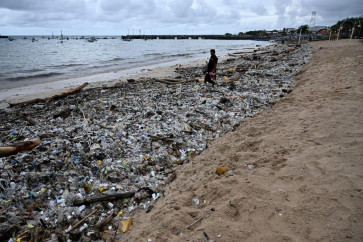Consumers lack protection from tainted food
Can of worms: Cans of mackerel, which are reported to contain anisakis specias — parasitic worms infectious to humans — are shown at the Food and Drug Monitoring Agency in Pekanbaru, Riau, on Wednesday
Change text size
Gift Premium Articles
to Anyone

C
span class="caption">Can of worms: Cans of mackerel, which are reported to contain anisakis specias — parasitic worms infectious to humans — are shown at the Food and Drug Monitoring Agency in Pekanbaru, Riau, on Wednesday.(Antara/FB Anggoro)
The discovery of unsafe food products, with the recent case involving threadworm-contaminated canned fish, has raised concerns about food standards in the country.
A string of food safety scandals from “fake eggs” to tainted fish appears to indicate that the government’s efforts to ensure food safety are falling short.
Paulus Wijaya, 24, a noodle restaurateur from East Jakarta, said repeated findings of unsafe food products led him to believe that government oversight, through the Food and Drug Monitoring Agency (BPOM), remained haphazard despite its efforts to create a modern food safety system.
“We eat every day; hence, food security is more than simply important. It is non-negotiable,” Paulus said on Friday.
Having doubts about BPOM’s food safety controls, Paulus said he always double-checked every ingredient he bought for his restaurant. Citing standardized food safety procedures for his restaurant, he said both expiry date labels and the flavor of all purchased food products had to be checked.
“Half the food ingredients for my restaurant are from products whose safety should have been guaranteed under BPOM’s oversight. I don’t trust it anymore,” Paulus said, referring to the recent finding of worm-infested canned fish in Riau.
Last week, a photo of canned mackerel reportedly containing roundworms went viral on social media. The product, which was found in Riau, was reported to have been registered with BPOM.
Responding to the report, officials from BPOM in Pekanbaru launched an investigation, from which they announced that the worm-contaminated mackerel comprised three brands, namely Farmer Jack, IO and Hoki.
“We have ordered the importers to immediately withdraw all of these products,” BPOM head Penny Kusumastuti Lukito said.
While confirming that the worms in the products had all been killed in the manufacturing process, the agency warned consumers about the health impacts of the products. “Worms can cause an allergic reaction in certain people,” said Penny.
As the government has declared food safety a national priority, BPOM has stepped up raids on shoddy food producers and distributors. However, the high profits from unsafe practices have led to tainted food products continuing to flood the country’s markets.
In Jambi, the province’s BPOM announced on Friday that major grocery chain Hypermart in Bungo regency was found to have placed pork sausages in the same spot as sausages made from chicken or beef.
Such practices can mislead customers, the agency said.
“The pork sausages also did not have a distribution permit from the BPOM,” said Nofrianti of the Jambi Health Agency.
In Jakarta, police raided on Tuesday a West Jakarta-based company, PT Pandawa Rezeki Semesta (PRS), that allegedly changed the expiration dates on several processed food products, such as mayonnaise, cheese and biscuits.
The expired food products might have been distributed to supermarkets in Greater Jakarta and to retailers in Bali; Surabaya, East Java; Medan, North Sumatra; and Pekanbaru in Riau, the police said.
Market inspections conducted by the BPOM are regarded by the Indonesian Consumers Foundation (YLKI) as ineffective in preventing them from selling unsafe products.
YLKI executive chairwoman Sularsi said the government should instead intensify inspections before the products are processed or imported.
“Otherwise our people will continue to eat trash,” she said. (srs)









